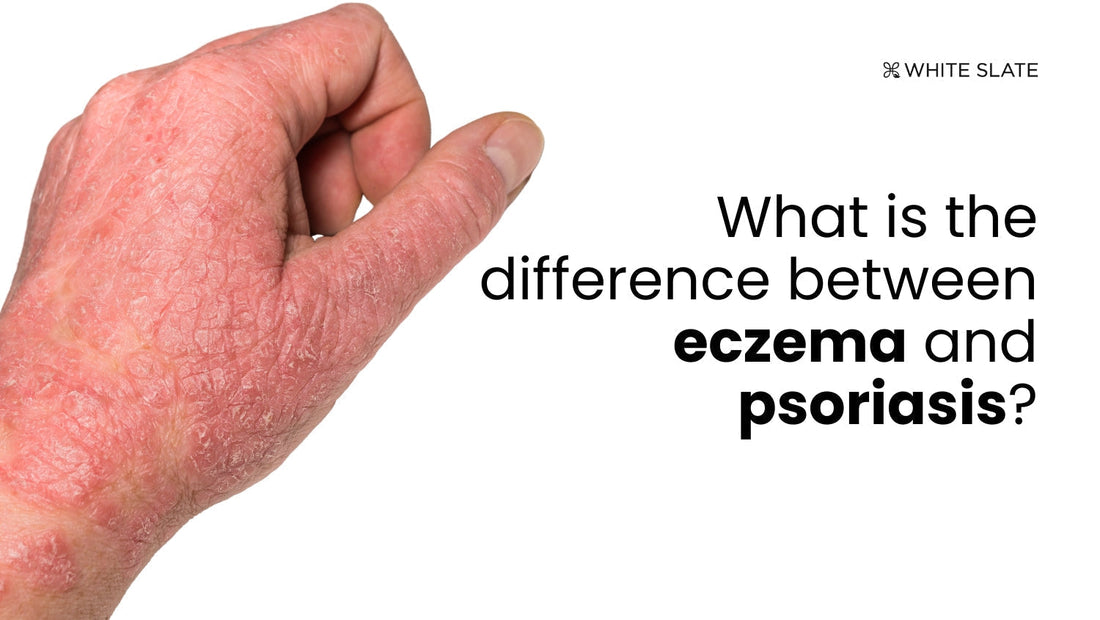Psoriasis and eczema are both long-term skin conditions that cause red, inflamed, and itchy patches on the skin. While they may appear to be the same at first sight, their causes, symptoms, and treatments are very different. Knowing the difference between psoriasis and eczema will enable you to decide what condition you may have and take the right steps towards treatment.
Who's Affected?
- Eczema, or atopic dermatitis, occurs in infants and children, but it may start or persist in adults too. It is usually inherited and is very associated with asthma, hay fever, or allergy. Sensitive individuals or individuals with compromised skin barriers are likely to develop eczema.
- Psoriasis may occur in any age group of individuals but most commonly develops at the age of 15 to 35 years. Psoriasis is an autoimmune disorder, wherein the immune system causes the skin cells to develop at an increased rate, resulting in thickened patches on the skin. Immune system issues and genetics are key causative determinants of psoriasis.
What You Feel
The sensation on your skin can be one of the largest indications of what you have.
- Eczema tends to make you itch severely, even before the rash. The itching is so severe that it can make sleeping or even carrying out routine activities difficult. Scratching can lead to bleeding or infections.
- Psoriasis tightens, stings, or burns your skin and causes itching. While it is not as itchy as eczema, the skin is painful, especially if there are cracks on the lesions.
What Do the Lesions Look Like?
- Eczema spots typically appear red, puffy, dry, and cracked. In more serious situations, small blisters that contain fluid or leaking spots may develop. With time, the skin hardens and becomes rough due to repeated scratching.
- Psoriasis plaques are more discrete and raised, with a dense white or silver scale. The skin beneath is characteristically red and inflamed. The patches can come together to form larger areas, especially on the scalp, elbows, or back.
Where You Get the Lesions
Eczema commonly appears on:
- The face and neck
- Inside the elbows and behind the knees
- Hands, wrists, and ankles
- Sometimes around the eyes and ears
Psoriasis tends to occur on:
- The scalp
- Elbows and knees
- Lower back and buttocks
- Palms and soles
- Nails (causing pitting or discoloration)
Psoriasis lesions are often symmetrical, showing up in the same places on both sides of the body.
Key Differences Between Psoriasis and Eczema
| Feature | Eczema | Psoriasis |
|---|---|---|
| Cause | Allergy-related, skin barrier issue | Autoimmune system dysfunction |
| Itchiness | Very intense | Moderate, with burning/stinging |
| Lesion appearance | Red, dry, possibly oozing | Thick, raised plaques with scales |
| Onset age | Infancy/childhood | Teenage years to adulthood |
| Common sites | Skin folds, face, neck | Scalp, elbows, knees, back |
Solutions and Skin Care Tips
There is no cure for either condition, but good skin care and lifestyle changes can manage symptoms and minimize flare-ups.
1. Maintain Skin Moisturized
Daily moisturizing is important in preserving the skin's natural barrier. Use fragrance-free, hypoallergenic creams or ointments that are soothing to inflammation and dryness.
2. Use Gentle Cleansers
Avoid cleansers that remove natural oils. Instead, use a mild, pH-balanced cleanser with calming ingredients such as chamomile, green tea, or allantoin to clean without aggravating.
3. Moisturize with Calming Toners
A toner with hyaluronic acid can pull water toward the skin and hydrate it. Select one that incorporates plant extracts to calm and shield the skin.
4. Stick to Natural Skincare
Apply skincare products that are alcohol-free, paraben-free, and artificial fragrance-free. These natural products will be less likely to irritate and cause allergic reactions.
5. Find and Avoid Triggers
Some of the common culprits are stress, allergens, weather, soaps, and clothing. Keeping a diary for your skin can help you record flare-ups and patterns.
6. Visit a Dermatologist
For moderate to severe cases, treatments such as corticosteroids, phototherapy, or immunomodulating drugs may be necessary. Never self-medicate—consult a skin expert.
Frequently Asked Questions (FAQs)
Q1. Can eczema change to psoriasis or vice versa?
No. They are two distinct conditions, but one individual may possibly have both.
Q2. Are they contagious?
No, neither eczema nor psoriasis is contagious.
Q3. Does diet influence these conditions?
Yes. An anti-inflammatory, healthy diet can potentially decrease flare-ups. Omega-3 foods, fruits, and vegetables are usually a good thing.
Q4. Does stress make symptoms worse?
Yes. Stress is a frequent trigger for eczema and psoriasis flare-ups.
Q5. Is it permissible to exfoliate when I have these conditions?
Exfoliate carefully. Harsh scrubs must be avoided, particularly with flare-ups. If necessary, use mild chemical exfoliants under direction.
Disclaimer
This blog is informational only and should not be interpreted as medical guidance. Always consult a licensed dermatologist for diagnosis, treatment, and skin care assistance appropriate to your requirements. Try any new skincare product on a small patch of skin before applying it full-time.

